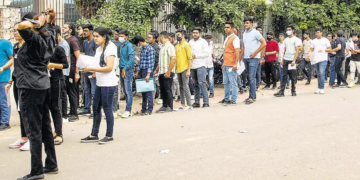Amid the persistent controversy surrounding the National Education Policy (NEP) 2020 and the recurring accusations of Hindi imposition, a new dispute has surfaced this time over the National Council of Educational Research and Training (NCERT). The Council’s decision to rename several English-medium textbooks with Hindi titles has reignited accusations of linguistic and cultural imposition, particularly from non-Hindi speaking states like Kerala and Tamil Nadu.
Textbooks Renamed Under NEP Framework
Under the NEP 2020, the NCERT has changed the names of a number of textbooks across different classes. Notably, the Class 6 English textbook has been renamed from Honeysuckle to Poorvi (meaning eastern). The English textbooks for Classes 1 and 2 have been renamed Mridang, and the Class 3 English book now carries the title Santoor both names referencing traditional Indian musical instruments.
Similarly, the Class 6 Mathematics textbook has been renamed Ganit Prakash, while Class 3’s is now titled Maths Mela. These changes, aimed at reflecting Indian culture, have sparked sharp political backlash.
Kerala and Tamil Nadu Term It ‘Hindi Imposition’
Unsurprisingly, the move has drawn strong criticism from the Kerala and Tamil Nadu governments—states that frequently oppose what they perceive as central overreach in matters of language and education.
Kerala’s Minister for General Education and Employment, V. Sivankutty, called the decision “a grave illogicality” and condemned NCERT’s move to assign Hindi names to English-medium textbooks. He accused the Centre of “cultural imposition” and claimed it was “sabotaging the linguistic diversity of the country.”
“It is absolutely wrong to change English titles that have existed for decades,” Sivankutty said on Monday. “These titles are not mere names—they shape the imagination of children. English medium students deserve English titles.”
The minister further demanded that NCERT withdraw the new names and called for all states to unite against what he termed as linguistic imposition. “Education must be an instrument of empowerment and consensus—not imposition,” he said.
Echoing similar sentiments, Tamil Nadu Congress Committee (TNCC) president K. Selvaperunthagai—whose party is part of the ruling DMK alliance—also demanded a rollback of the changes.
Selvaperunthagai pointed out that the name Honeysuckle for Class 6 has been changed to Poorvi, and Honeycomb for Class 7 is also being replaced with a Hindi title. “Names like Mruthang and Santhoor are being introduced for English textbooks, and the Math book has been renamed Ganita Prakash. This cannot be accepted,” he said, warning that such moves are fuelling resentment in non-Hindi-speaking states.
NCERT Defends Move, Calls It ‘Decolonisation’
As political opposition mounted, the NCERT responded with a clarification. It rejected claims of Hindi imposition and said the naming changes were consistent with the pedagogical goals of NEP 2020, which emphasizes promotion of Indian languages and knowledge systems.
According to an NCERT official, the move aims to “decolonise the curriculum” and align education with India’s rich cultural heritage. The new titles—such as Poorvi, Mridang, and Santoor—are described as culturally meaningful, pan-Indian in essence, and “neither translatable nor replaceable.”
“These terms transcend language barriers and reflect our artistic and musical heritage,” the official stated. NCERT further emphasized that the use of Roman script for these names ensures accessibility for students from all language backgrounds, mitigating the need for Hindi literacy.
The council insisted that the naming decisions were rooted in NEP 2020’s broader vision of integrating art, music, and cultural values into education—not to promote any one language.
Balancing Culture and Sensitivity
Notably, not all textbooks have undergone such changes. For example, the Class 6 Science book is titled Curiosity in English, while the Hindi and Urdu versions are named Jigyasa and Tajassus respectively. Similarly, the Class 6 Social Science book is called Exploring Society: India and Beyond in English, and Samaj Ka Adhyayan: Bharat aur Uske Aage in Hindi.
This mixed approach suggests that the NCERT’s intent may not be to impose Hindi, but rather to promote cultural expressions that resonate across linguistic lines. However, as critics argue, the council must be more transparent in its approach and ensure wider consultation to avoid misinterpretations—especially in states like Kerala and Tamil Nadu, where linguistic pride is politically significant.
A Familiar Flashpoint in Language Politics
This controversy adds to an already tense discourse around the NEP 2020. Earlier this year, Tamil Nadu reignited the “Hindi colonialism” debate, opposing the Centre’s three-language policy—despite the fact that NEP 2020 does not mandate Hindi and allows flexibility for states and students.
The policy stipulates that every student should learn three languages: one foreign and two Indian, including at least one regional language. This approach stems from a 1961 consensus among state leaders and was designed to promote multilingualism and national integration.
Though critics have dismissed the language policy debate as politically motivated, concerns around the textbook titles include practical issues like pronunciation and comprehension. In the foreword to the newly named Class 6 English textbook Poorvi, NCERT Director Dinesh Saklani noted that the book integrates Indic knowledge systems, promotes digital literacy, and upholds values such as gender equality.
Still, the question remains—why not retain English titles for English-medium books, particularly when the intent is not to teach Hindi?
As the row continues, NCERT’s challenge will be to reaffirm its commitment to inclusivity without compromising cultural identity. For that, clearer communication and consensus-building may be key.

















Comments